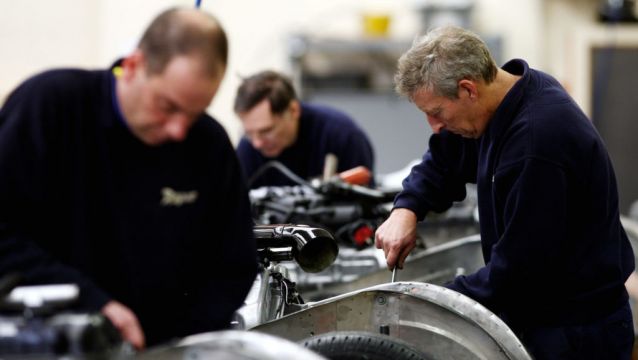The UK’s manufacturing sector saw growth slow last month on the back of surging material and staff shortages, according to new figures.
The closely watched IHS Markit/CIPS Purchasing Managers’ Index (PMI) returned a reading of 57.1 for September, down from 60.3 in August.
Any reading above 50 implies growth.
The reading showed the sector was still in growth but represented the weakest performance since February and the fourth consecutive month of decline.
Nevertheless, it was slightly ahead of expectations as economists had predicted a reading of 56.3 for the month.
🇬🇧 The UK manufacturing PMI fell to 57.1 in September (Aug: 60.3) amid softer output and new order growth. Labour shortages and supply-chain strain persisted, contributing to sharp inflationary pressures. Read more: https://t.co/thNxN3Tj9P pic.twitter.com/VzJTilcjg3
— S&P Global PMI™ (@SPGlobalPMI) October 1, 2021
Rob Dobson, director at IHS Markit, said the figures highlight the “risk of the UK descending towards a bout of stagflation”, as growth in output and new orders sharply eases while costs and selling prices soar.
He added: “Companies are facing a growing list of headwinds, which includes declining new export orders, component shortages, delays to air, land and sea freight, staff shortages exacerbated by Covid-19 illnesses, Brexit disruptions, sharply rising costs and now fuel shortages.
“Production growth is severely impacted by the ongoing strain across supply chains and, with demand far exceeding supply, the inevitable result has been higher prices, which will ultimately hurt the pockets of consumers.”
The latest report showed material shortages, longer supplier lead times and capacity constraints — which included staff and skills shortages — resulted in disruption to production schedules during the month.
It also showed that lead times surged to one of the highest levels on record, as firms particularly highlighted “delays to air, land and sea freight” and other supply chain issues.
Meanwhile, new orders rose at the weakest pace since February and new export work contracted for the first time in eight months.
Manufacturers also continued to report labour shortages, stressing difficulties hiring workers with specific skills.







